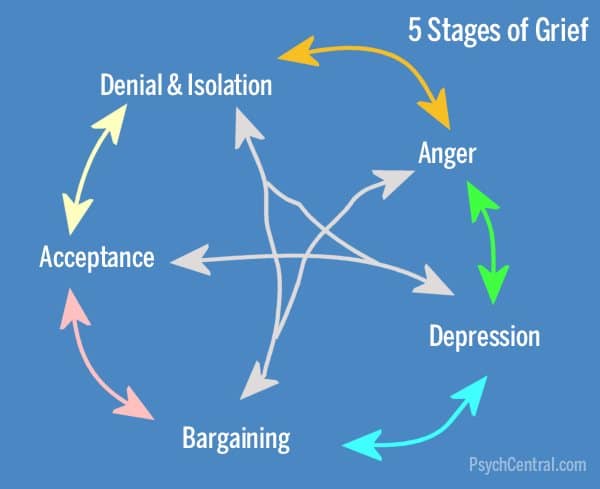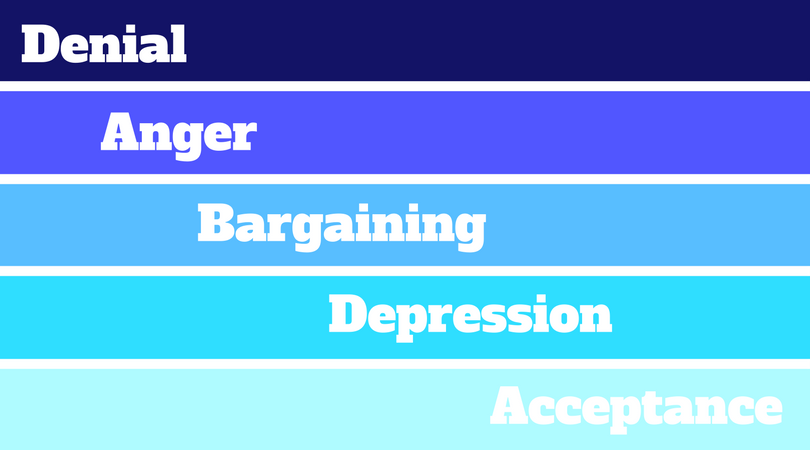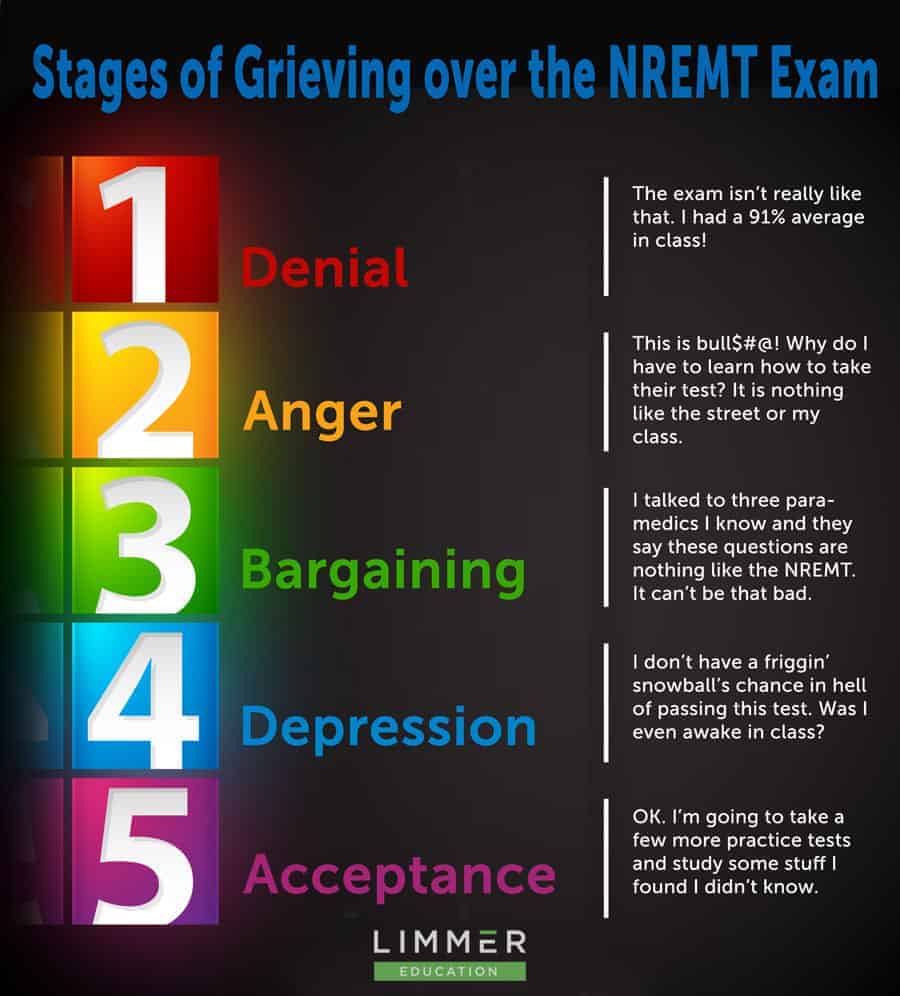A Guide for Caregivers revised 2007. The internal organs liquefy and the body begins to dry out.
 Five Stages Of Grief Understanding The Kubler Ross Model
Five Stages Of Grief Understanding The Kubler Ross Model
Dying is a shutting down of the bodys physical sensory and mental functions and it happens in stages.

Five stages of dying. The five stages of coping with dying DABDA were first described by Elisabeth Kuebler-Ross in her classic book On Death and Dying in 1969. A theory developed by psychiatrist Elisabeth Kuebler-Ross suggests that we go through five distinct stages of grief after the loss of a loved one. This process can take minutes or months depending on what is going on inside the persons body.
When individuals and their relatives first receive the news of a fatal disease they are shocked. Kuebler-Ross was a 2007 inductee into the National Womens Hall of Fame was named. The gases from bacterial decay begin to escape causing a strong odor.
The dying process usually begins well before death actually occurs and understanding this process can sometimes help you recognize when your loved one is dying. The five stages of dying are denial and isolation anger bargaining depression and acceptance according to the University of Kentucky. Although commonly referenced in popular culture studies have not empirically demonstrated the existence of these stages and the model is considered to be outdated inaccurate and unhelpful in explaining the grieving process.
Explore our resources and forums to help. These stages have different emotional responses that people go through in response to the knowledge of death. There are changes that take place physically behaviorally and psychologically in the journey towards death that are signs that the end of life may be nearing.
The five steps are denial anger bargaining depression and acceptance. The five stages denial anger bargaining depression and acceptance are a part of the framework that makes up our learning to live with the one we lost. Elisabeth Kuebler-Ross July 8 1926 August 24 2004 was a Swiss-American psychiatrist a pioneer in near-death studies and author of the internationally best-selling book On Death and Dying 1969 where she first discussed her theory of the five stages of grief also known as the Kuebler-Ross model.
The 5 stages include denial anger bargaining depression and acceptance. On Death and Dying originally applied the five stages of grief solely to people experiencing a terminal illness. Shock denial anger bargaining depression acceptance and decathexis.
The five stages of grief are. The five stages of grief model postulates that those experiencing grief go through a series of five emotions. What to expect when your loved one is dying.
They describe the stages people go through when they learn that they or a loved one are dying beginning with the shock or denial of the moment and up to the point of acceptance. This is the slowest of the five stages. In On Death and Dying Kuebler-Ross famously delineated the stages of denial and isolation anger bargaining depression and acceptance to meticulously describe the emotional states seriously ill people commonly experienced and the adaptive mechanisms they used to make sense of and live with incurable conditions.
Next they cannot accept the fact that the illness could affect them denial. These stages also earn the name Kubler-Ross Model after Elizabeth Kubler-RossHer late 1960s book On Death and Dying described five distinct stages most people will undergo when facing a terminal diagnosisThe model has since been adapted to discuss people. How to deal with grief and loss.
This stage brings further discoloration to the body. Denial anger bargaining depression and acceptance. But they are not stops on some linear timeline in grief.
The stages of death usually refer to various stages a dying person undergoes when preparing for death given adequate time to prepare. In 1969 she wrote On Death and Dying which introduced the five stages of grief. Elisabeth Kuebler-Ross described the following stages of grief related to dying.
Not everyone goes through all of them or in a prescribed order. In summary Kubler-Ross and colleagues developed a five stage model of death and dying. Elisabeth Kuebler-Ross was a Swiss-American psychiatrist whose work centered around terminally ill patients.
The grieving person is striving to reach the last step of acceptance. This book is about these 5 stages of dying and how their relation to the grieving process that different stages or periods of grieving are categorized. Not everyone will experience all five stages and you may not go through them in this order.
What Are the Stages of Dying. They are tools to help us frame and identify what we may be feeling. These stages are based on the research of Elizabeth Kubler-Ross in On Death and Dying and they are called the Kubler-Ross Theory.
When you are with a person who is about to die it is good to know the physical signs of dying so you can understand what is happening. Denial anger bargaining depression and finally acceptance. The model was introduced by Swiss-American psychiatrist Elisabeth Kuebler-Ross in her 1969 book On.
The 5 stages include denial anger bargaining depression and acceptance. The five stages are common experiences which occur in any order but may not always occur for some individuals.
 On Grief And Grieving Book By Elisabeth Kubler Ross David Kessler Maria Shriver Official Publisher Page Simon Schuster
On Grief And Grieving Book By Elisabeth Kubler Ross David Kessler Maria Shriver Official Publisher Page Simon Schuster
Normal reactions to change.

Kubler ross stages of death and dying. They describe the stages people go through when they learn that they or a loved one are dying beginning with the shock or denial of the moment and up to the point of acceptance. Kubler-Rosss Stages of Dying Medical professionals come across dying patients daily. The five stages of grief model postulates that those experiencing grief go through a series of five emotions.
Five Stages of Grief condensed version On Death Dying On Grief Grieving Coping with Holidays Dealing with Pain The 10 Best and Worst Things to Say to Someone in Grief 10 Things to Help Children in On Death and Dying Uncertain Times Books Books provided by NHPCO On Grief and Grieving is Elisabeth Kuebler-Rosss final legacy one that brings. The five stages denial anger bargaining depression and acceptance are a part of the framework that makes up our learning to live with the one we lost. In summary Kubler-Ross and colleagues developed a five stage model of death and dying.
The model was introduced by Swiss-American psychiatrist Elisabeth Kuebler-Ross in her 1969 book On. Probably the most well-known theory about how we deal with death is the Kuebler-Ross model and its 5 stages of grief. All her work made doctors more aware as well as more sensitive to peoples emotional needs.
This theory says that there are 5 different stages people go through when they deal with death whether its their own or a loved ones. Treating a terminal illness involves making the patient prepare for his death and various efforts to mitigate the adverse symptoms. Children may grieve a divorce a wife may grieve the death of her husband a teenager might grieve the ending of a relationship or you might have received terminal medical news and are grieving your pending death.
Professor in Pastoral Theology Personality and Culture Inter-American University of Puerto Rico Metropolitan Campus Kalathos 1 no. It is most important to understand the difference between normal sadness and clinical depression. These stages have different emotional responses that people go through in response to the knowledge of death.
But he usually goes through all of these stages to reach acceptance. What is the Kuebler-Ross model. The Kuebler-Ross model commonly known as the Five Stages of Grief is a popular theory developed by Swiss-American psychiatrist Elisabeth Kuebler-Ross on how people generally deal with death loss and grief.
Kubler-Rosss five successive stages of death and dying are denial. The five stages of grief Kubler-Ross observed and wrote about are. Although commonly referenced in popular culture studies have not empirically demonstrated the existence of these stages and the model is considered to be outdated inaccurate and unhelpful in explaining the grieving process.
When Kubler-Ross wrote about these stages she explained that these are normal reactions we have to tragic news. According to Kubler-Ross in her study of the terminally ill it is this stage that the person realizes his or her certain death and may realize that the situation is hopeless. PASTORAL AND CLINICAL IMPLICATIONS OF THE DEATH AND DYING STAGE MODEL IN THE CARING PROCESS By Jesus Rodriguez Sanchez PhD.
Kubler-Rosss study identified five stages of dying. Published in On Death and Dying the Elisabeth Kubler-Ross theory of grief offers stages of emotion that are sometimes abbreviated as DABDA. The patient may move back and forth through the different stages as he and his family members react to the process of dying.
The five stages of coping with dying DABDA were first described by Elisabeth Kuebler-Ross in her classic book On Death and Dying in 1969. Denial anger bargaining depression and acceptance. What Are the 5 Stages of Grief.
These stages have different emotional responses that people go through in response to the knowledge of death. With more people dying and holding the funeral outside their home it has generally changed people reaction to death and dying. They are commonly referred to by an acronym of DABDA and are denial anger bargaining depression and acceptance.
Working with such patients effectively is difficult. The fourth stage of dying has the most potential for turning into grief. In 1969 Elisabeth Kuebler-Ross described five popular stages of grief popularly referred to as DABDA.
Her book On Death and Dying written in 1969 has revolutionized the care that dying people receive. The theory was initially developed to help terminally ill individuals accept their impending death. In summary Kubler-Ross and colleagues developed a five stage model of death and dying.
Kubler-Ross was able to identify patients emotional responses and she has grouped these reactions into five different stages of grief and death. You can look at this from a linear progression moving from denial then to anger then to bargaining and so on. Introduced to the world in the 1969 book On Death and Dying by Elisabeth Kuebler-Ross the Kuebler-Ross model sometimes called the DABDA model surmises that there are sequential stages of various emotions that a patient goes through when diagnosed with a terminal illness starting with denial and ending with acceptance.
Oftentimes we feel uncomfortable interacting or talking to a patient who is dying. There are five stages of grief that were first proposed by Elisabeth Kuebler-Ross in her 1969 book On Death and Dying. Denial anger bargaining depression and acceptance.
They are tools to help us frame and identify what we may be feeling.
These stages are not really stages that a person goes through in order or only once. Breathing patterns can change to a long loud deep breath followed by several seconds of not breathing.
 10 Stories For The 5 Stages Of Grief Electric Literature
10 Stories For The 5 Stages Of Grief Electric Literature
Most individuals experience these stages but the stages may occur in different orders depending on the individual.

5 stages of death and dying. We are in a state of shock and denial. The stages of death usually refer to various stages a dying person undergoes when preparing for death given adequate time to prepare. Kubler-Rosss study identified five stages of dying.
Elisabeth Kuebler-Ross was a Swiss-American psychiatrist whose work centered around terminally ill patients. Life makes no sense. The five stages of coping with dying DABDA were first described by Elisabeth Kuebler-Ross in her classic book On Death and Dying in 1969.
This theory says that there are 5 different stages people go through when they deal with death whether its their own or a loved onesBut Kuebler-Ross studies became very popular and frequently misinterpreted probably because they werent always explained accurately. In summary Kubler-Ross and colleagues developed a five stage model of death and dying. She proposed five stages of grief.
Explore our resources and forums to help. However for some these stages might occur in a totally different way. The Five Stages of Grief.
The five steps are denial anger bargaining depression and. Dying is a shutting down of the bodys physical sensory and mental functions and it happens in stages. Five Stages of Loss.
Nor are they stages that occur with the same intensity. The five stages of grief are also known as the Kuebler-Ross model. Kubler-Ross 1969 1975 describes five stages of loss experienced by someone who faces the news of their impending death.
Children may grieve a divorce a wife may grieve the death of her husband a teenager might grieve the ending of a relationship or you might have received terminal medical news and are grieving your pending death. Probably the most well-known theory about how we deal with death is the Kuebler-Ross model and its 5 stages of grief. Elizabeth Kuebler-Ross 1969 who worked with the founders of hospice care described the process of an individual accepting his own death.
Denial anger bargaining depression and acceptance. Stages of Death and Dying In the sixties Elisabeth Kubler Ross a Swiss American psychiatrist was working with patients who were dying. This can be one of the eeriest signs of dying and has been called a death rattle when the person is by this afflicted particularly heavily.
You can look at this from a linear progression moving from denial then to anger then to bargaining and so on. We wonder how we can go on if we can go on why we should go on. In 1969 Elisabeth Kuebler-Ross described five popular stages of grief popularly referred to as DABDA.
This book is about these 5 stages of dying and how their relation to the grieving process that different stages or periods of grieving are categorized. The five stages of grief model or the Kuebler-Ross model postulates that those experiencing grief go through a series of five emotions. Ross book On Death and Dying the Five Stages insight helps us gain understanding and insight into the emotional and social experience of dying or the death of a loved one.
DENIAL Denial is the first of the five stages of grief. These stages have different emotional responses that people go through in response to the knowledge of death. What Are the Stages of Dying.
Having an intense curiosity about what they were experiencing she focused on the patient as a human being to include them in dialogues and to learn their strengths and weaknesses. Elisabeth K ue bler-Ross described the following stages of grief related to dying. In 1969 she wrote On Death and Dying which introduced the five stages of grief.
When you are with a person who is about to die it is good to know the physical signs of dying so you can understand what is happening. Denial anger bargaining depression and acceptance. Next they cannot accept the fact that the illness could affect them denial.
When individuals and their relatives first receive the news of a fatal disease they are shocked. Although these five stages are universal individuals spend a different period experiencing each stage. Also it is true that most terminally ill patients go through the stages of death and dying in the order we presented above.
The 5 Stages of Grief Loss. It helps us to survive the loss. The Five Stages of Grief As originally outlined in Dr.
In this stage the world becomes meaningless and overwhelming. This process can take minutes or months depending on what is going on inside the persons body. Denial anger bargaining depression and acceptanceAlthough commonly referenced in popular culture studies have not empirically demonstrated the existence of these stages and the model is considered to be outdated inaccurate and unhelpful in.
The stages of grief are commonly referred to as the 5 stages of dying as referred to in her book On Death and Dying. The 5 stages include denial anger bargaining depression and acceptance. Shock denial anger bargaining depression acceptance and decathexis.
These stages also earn the name Kubler-Ross Model after Elizabeth Kubler-RossHer late 1960s book On Death and Dying described five distinct stages most people will undergo when facing a terminal diagnosisThe model has since been adapted to discuss people. On Death and Dying. They describe the stages people go through when they learn that they or a loved one are dying beginning with the shock or denial of the moment and up to the point of acceptance.
With more people dying and holding the funeral outside their home it has generally changed people reaction to death and dying.